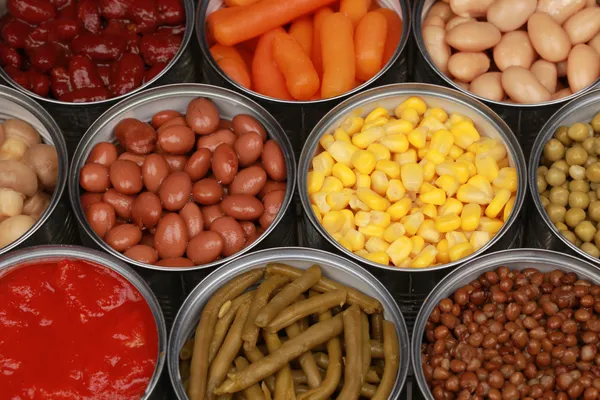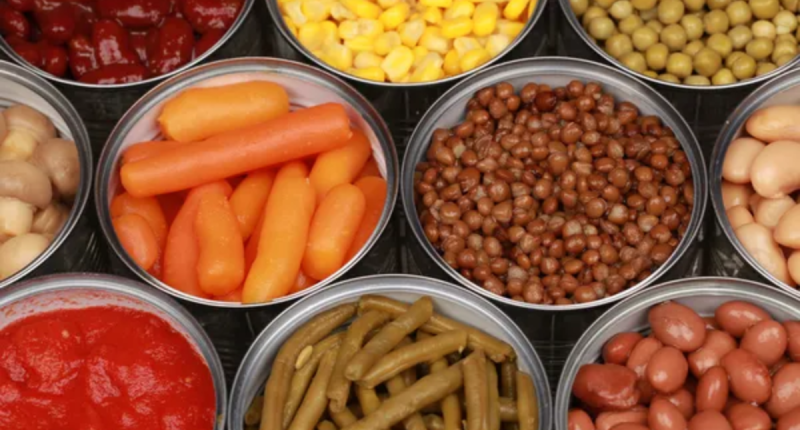What Happens If You Eat Canned Food Every Day? According to the National Institute of Health, canned foods account for 20 percent of the average American’s daily caloric intake. While canned foods are convenient and often less expensive than fresh or frozen foods, there is some concern that the canning process may affect the nutritional value of these foods.
The canning process involves heating food to high temperatures in order to kill bacteria and preserve the food. This process can also cause some nutrients, such as vitamins A and C, to break down. However, many canned foods are now fortified with vitamins and minerals to replace those lost during processing.
Now, What Happens If You Eat Canned Food Every Day?

What Happens If You Eat Canned Food Every Day?
While tinned food can provide necessary sustenance during emergency situations or when fresh options are limited, relying solely on canned food may have certain implications. Canned goods often contain preservatives and high levels of sodium to maintain their flavor and extend their shelf life. Consequently, excessive consumption of these foods can lead to increased intake of unhealthy additives that might negatively impact one’s health in the long run. Additionally, some studies suggest that the lining of cans contains bisphenol-A (BPA), a chemical known for its potential negative effects on hormone regulation if ingested regularly. Furthermore, consuming predominantly processed foods from cans may result in inadequate nutrient intake as they generally lack the same level of nutritional value found in fresh produce and whole grains.
RELATED: BPA In Canned Foods: What Is It and Why Is It a Concern?
Nutritional Benefits and Risks of Eating Canned Food Everyday
The nutritional benefits of canned foods include the fact that they are often fortified with vitamins and minerals, and can be a good source of fiber. However, canned foods can also be high in sodium and sugar, which can offset any nutritional benefits. Additionally, canned foods may contain harmful chemicals like BPA that can leach into the food.
The risks of eating canned food every day include an increased risk for developing obesity, hypertension, and other chronic diseases. Canned foods may also increase your exposure to toxins like BPA. If you are concerned about the risks associated with canned foods, consider limiting your intake or avoiding them altogether.
Common Types of Canned Foods
There are many different types of canned foods available on the market, and each one can have a different effect on your nutritional intake. Here are some of the most common types of canned foods:
Fruits: Fruits are a healthy option when canned, as they retain most of their nutritional value. However, canned fruits often contain added sugar or syrup, which can add to your daily calorie intake.
Vegetables: Vegetables are another healthy option when canned, and they also retain most of their nutritional value. However, some vegetables may be less nutritious when canned, such as tomatoes and potatoes.
Meat and fish: Meat and fish can be a healthy part of your diet when canned, but they may also contain high levels of sodium. If you are watching your salt intake, you may want to choose low-sodium options or cook fresh meat and fish instead.
Soups: Soups can be a quick and easy way to get nutrients, but many soups are high in sodium. If you are watching your salt intake, you may want to choose low-sodium soups or make your own soup at home using fresh ingredients.
Beans: Beans are a great source of protein, fiber, and other nutrients. However, canned beans often contain added salt and sugar, so you may want to look for low-sodium or no-added-sugar options.
What to Look for in Nutrition Labels
When you are trying to improve your diet, one of the first places to look is the nutrition label. The label can tell you a lot about what is in your food and how it might affect your health. Here are some things to look for when you are reading nutrition labels:
• Calories: This is how much energy you will get from eating this food. If you are trying to lose weight, you will want to choose foods with fewer calories.
• Fat: This is the amount of fat in the food. Too much fat can lead to health problems like heart disease.
• Cholesterol: This is a type of fat found in food. Eating too much cholesterol can also lead to health problems like heart disease.
• Sodium: This is the amount of salt in the food. Too much sodium can cause high blood pressure.
• Fiber: This is a type of carbohydrate that helps your body stay healthy. Foods with more fiber are usually healthier than those with less fiber.
• Vitamins and minerals: These are nutrients that your body needs to stay healthy. You will want to choose foods that have more vitamins and minerals if you are trying to improve your diet.
Alternatives to Eating Canned Food Everyday
If you’re looking for alternatives to eating canned food every day, there are plenty of options available. Fresh fruits and vegetables are always a good choice, and you can also find many healthy canned food options that are not as processed as some of the other choices out there. Here are some tips on how to choose the right canned foods:
– Look for brands that use fresh ingredients and have minimal processing.
– Avoid cans that are lined with BPA or other harmful chemicals.
– Choose canned fruits and vegetables that are packed in water or their own juices rather than syrup.
– Check the sodium content of canned soups and beans before purchasing.
Dietary Recommendations
- Moderation is Key: To mitigate potential health risks, it is advisable to consume canned food in moderation and opt for low-sodium or BPA-free options when possible.
- Balance with Fresh Foods: Incorporate fresh fruits, vegetables, and whole foods into your diet to complement canned items and ensure a well-rounded nutritional intake.
- Read Labels: Always read the labels on canned products to check for nutritional information, sodium levels, and the presence of additives or preservatives.
- Cook Thoughtfully: When using canned ingredients in recipes, be mindful of sodium content and consider rinsing canned vegetables to reduce sodium intake.
FAQs
Q: Can canned food be part of a healthy diet? A: Yes, canned food can be part of a healthy diet when consumed in moderation and combined with fresh, whole foods.
Q: Are there alternatives to canned food with a longer shelf life? A: Yes, alternatives include freeze-dried and dehydrated foods, as well as vacuum-sealed packaging, which can extend shelf life without the need for excessive preservatives.
Q: Can I reduce my BPA exposure from canned food? A: Yes, opt for BPA-free canned goods or consider choosing fresh or frozen alternatives.
Q: How can I reduce the environmental impact of canned food consumption? A: Recycle empty cans, choose products with eco-friendly packaging, and support sustainable fishing practices.
Q: Are there specific health risks associated with canned meat products? A: Canned meat products may contain higher levels of sodium and preservatives. It’s advisable to consume them sparingly.
Q: Can canned food contribute to weight gain? A: Overconsumption of high-sodium canned foods may lead to water retention and contribute to temporary weight gain. However, it is not a direct cause of long-term weight gain.
SOURCES|
1. Frequent Canned Food Use is Positively Associated with Nutrient-Dense Food Group Consumption and Higher Nutrient Intakes in US Children and Adults – MDPI
2. Bisphenol-A (BPA) in Foods commonly consumed in Southwest Nigeria and its Human Health Risk – Scientific Reports
3. Nutritional comparison of fresh, frozen and canned fruits and vegetables. Part 1. Vitamins C and B and phenolic compounds – Science of Food and Agriculture
4. Canned Fruits And Vegetables – Research reports
5. Determination of the Level of Selected Elements in Canned Meat and Fish and Risk Assessment for Consumer Health – Journal of Analytical Methods in Chemistry





